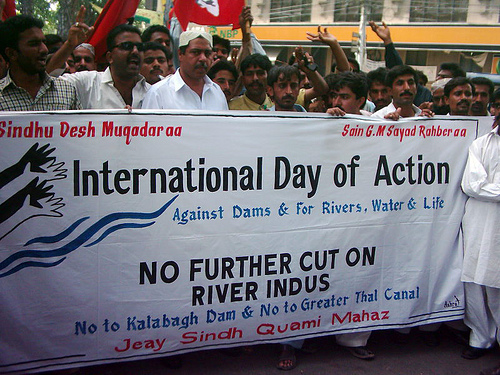As a country of great geographical importance and an ally to US in its war against terrorism; Pakistan has a huge crisis at hand. The country is deemed as a nuclear power but it is currently facing an immense power and energy shortage. With a daily eight to ten hour of country wide power outage routine, both business and personal life of Pakistanis are hampered. Mumtaz A. Piracha, in his blog post [1] puts it quite aptly:
“In June 2007, the power cuts in Pakistan lasted no more than 3 or 4 hours a day. Today, in extremely hot weather, Pakistanis have to endure without electricity for 8 to 10 hours a day. Industrial production is suffering, exports are down, jobs are being lost, and the national economy is in a downward spiral. By all indications, the power crisis in Pakistan is getting worse than ever.”
Karachi city, which is Pakistan’s biggest financial and industrial hub, is facing a deficit of approximately 700 MW against a fair demand of total 2200MW. The present situation continues to cause a huge industrial loss and adding nuisance to an already troubled economy. Riaz Haq, a Pakistani blogger, looks at the rising energy demand very critically and shares vital information with his blog [2] readers:
“At an Asia Program event organized by Wilson Center in 2006, Vladislav Vucetic of the World Bank provided a troubling assessment of the state of Pakistan’s electricity sector—demand is approaching maximum production capacity, while institutional capacity for policy development and implementation remains low. Worse, failing to resolve these problems may cause investment delays and hamper Pakistan’s economic growth.”
It’s not the economy that’s singly paying for the incompetence and corruption of previous and present Governments. In fact the everyday life of an average Pakistani has come to a standstill. In a blog post [3] Saeed Shah narrates the story of a working Pakistani woman:
“Children can't do their homework. Household work doesn't get done, as washing machines and other appliances cannot work. When you go home from work, you have no idea whether there will be electricity at home. Your whole life is disturbed,” said Mahnaz Peracha of the Network for Consumer Protection, an independent Pakistani advocacy group.”
 [4]
[4]Protest Against Kalabagh Dam and Thal Canal. Image by Flickr user International Rivers. CC By-nc-sa
Energy crisis of such magnitude doesn’t come about one fine day. Question arises what led to all this? For more than a decade KalaBagh Dam Controversy [5] has annoyed the nation like an old gramophone. Pakistan, since its very creation, fixated on hydropower as its only technique of power generation. Minus the politics, KalaBagh Dam was a brilliant project and could have supported the national need for years to come. Tahir Hameed pens down the lack of national consensus on Kalabagh Dam issue in his post [6]:
“The inability of provinces and governments to resolve the Kalabagh Dam issue speaks volumes about our acumen and wisdom especially when International bodies point out that the building of Kalabagh dam will save the country from becoming a barren desert.”
In the current scenario Government, power producers and distributors are all trapped in a circular debt, which has administratively damaged the already worsen situation. Riaz Haq writes [7]:
The key players in this “circular debt” trap are the federal and provincial governments as the biggest deadbeats, the power distributors like KESC [8], the power producers like Pepco [9] and Hubco [10], and the fuel suppliers like government-owned Pakistan State Oil [11] (PSO) and partially state-owned Pak-Arab Refinery Ltd [12] (PARCO). This debt circle begins with the government as the biggest debtor and ends with a government-owned entity as the biggest creditor….. Is there a personal profit motive of the top leader of the ruling PPP, who is allegedly pushing rental power plants (RPPs) contracts ahead of the speedy resolution of circular debt? Is it a combination of corruption and incompetence?
Work around like Rental Power Plants (RPPs) is look down upon by the Pakistani people, blogger from My Land Pakistan [13] shares similar sentiments:
“The whole drama of load shedding is being played to create the importance of RPPs (RENTAL POWER PLANTS) among the people. There has been great criticism on the government from the media and public on the issue of RPPs”
Is there an alternate solution, if we don’t go with RPPs?
Saeed Qureshi [14] enlightens us with his upright opinion:
“Iran has offered Pakistan up to 2270 MG way back in 2008 to beef up the indigenous power production and to offset the shortage that has brewed up an unremitting social and economic chaos. And when Iran is bending over backward and frantically trying to help Pakistan overcome its chronic energy deficiency , the government looks askance, willfully ignores such direly needed offer and prefers the make-shift arrangements for generation of electricity that are not only overly expensive, are squarely unreliable but also cannot meet the energy requirements of the country. A newly born marvelous nation is the helpless victim of a monstrous rip off by a pack of greedy, rapacious, money hunting human hounds.”
While the authorities employ their power shedding experiments on the nation, Pakistani public helplessly endures the menace for the time being. But from the deteriorating condition at hand one cannot disregard the possibility of a violent outburst from the seemingly patient majority.